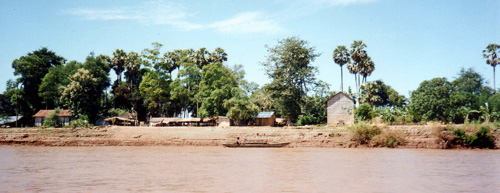6 |

PHOTO: RICH GARELLA
JUST OVER FIFTY YEARS AGO, with her mother as midwife, Dee Yon gave birth to a fat baby boy on the floor of a wooden house in Peam Koh Snar village, on the Mekong river in Kampong Cham province.[s]
Cambodia was a peaceful, pastoral land, a French colony at the threshold of independence. Peasants like Dee Yon, who made up the bulk of the population, lived much as they had for a thousand years, growing rice, tending water buffalo, cutting wood in the forest, living from season to season.
Dee Yon and her soldier husband named the boy Hun Bunall, Nall being a common name for a pudgy child. Villagers there still call him by that name. It was the Year of the Dragon[n] and a Tuesday no less; this child would be a stubborn one.
At 13, his family sent him downriver to continue his education. Arriving in Phnom Penh with the equivalent of less than 50 cents, he moved into a pagoda, waiting on the monks, studying in his spare time. He took a new name, Ritthi Sen, from an ancient Khmer story about a boy who endures eleven wicked stepmothers.
He stayed in the capital, he later told his biographers, until 1969, when just before graduating from high school he was forced to flee the pagoda. Sihanouk’s secret police were trying to stave off a rising rebellion by a mysterious communist movement that Sihanouk dubbed the “Khmer Rouge,” or “Red Khmer,”, and his security forces began to harass the monks, who were suspected of sympathizing with the Communists. Soon after, Sihanouk was toppled not from the left, but from the right, in a putsch that installed General Lon Nol, a hard-line anti-communist backed by the United States.
Sihanouk, from his exile in China, quickly joined his Communist former enemies, the Khmer Rouge. To bolster their common struggle, he called upon his “little people” to join the fight for liberation. Ritthi Sen changed his name to Hun Samrach—Samrach meaning “someone who completes his life’s work”—and joined the movement. Samrach was wounded several times as he rose through the ranks of the Khmer Rouge.
In 1972, after what he described as a heroic raid, he changed his name again. As Hun Sen, he lost an eye in the battle for Kampong Cham, on April 16, 1975, the day before the Khmer Rouge took Phnom Penh and sent the Americans fleeing in helicopters.[n] Cambodia's cities and towns emptied out by order of the new regime. The crash of falling bombs was replaced by the scratch of the shovel and the dull thud of the hoe.
Two years into the nightmare, Hun Sen was a deputy regimental commander, in charge of 2,000 Khmer Rouge troops. By then, however, the regime had already turned on itself. Although Vietnamese communist support had been instrumental in the Khmer Rouge takeover, Cambodia’s historical (and not entirely unjustified) fear of its much more populous and powerful neighbor soon trumped any sense of ideological kinship.[n]
In 1977, Hun Sen was ordered to take part in what he considered a foolhardy attack on Vietnam. Perhaps fearing that he would be swept up in the regime’s increasingly vicious internal purges, he fled into the waiting arms of Cambodia’s enemy instead.[s] Over the next year, the Khmer Rouge, under the delusion that each Cambodian soldier could kill 30 Vietnamese, mounted a series of vicious—and suicidal—attacks on Vietnamese border villages. At the end of 1978, the Vietnamese army, along with a group of Cambodian defectors and exiles, marched into Cambodia,[n] quickly overthrew the Khmer Rouge, and drove its tattered remnants to the Thai border.[n]
After seizing Phnom Penh, Vietnam flew a 28-year-old Khmer Rouge defector to the capital and made him foreign minister in the replacement regime. They called him Mai Phuc, or Happiness Forever, but he has become known to the world as Hun Sen.
 | |
| Hun Sen in 1985 |
In 1985 he was made prime minister, and, backed by Vietnam and the Soviet Union, he presided over the continuing war against the Khmer Rouge and its domestic allies, who were based on the Thai border and in the refugee camps and supported by the United States, China, and Thailand. When the Soviet bloc collapsed, the Vietnamese pulled out, leaving Hun Sen and his party apparatus in charge, lacking financial and military support, and—eventually—willing to sign the Paris Peace Agreement in 1991.[n]
He let the United Nations administer the country for two years preceding the 1993 elections. But when his party, renamed the Cambodian People’s Party, narrowly lost to Funcinpec, he declared that unless the CCP received a share of power, Cambodia would again disintegrate into warfare. Sihanouk and the international community gave in.
To Hun Sen, the lesson was clear. An election means aid money, and electoral defeat means nothing as long as you retain both the threat of military takeover and the knowledge that the international community has no stomach for a fight. Through the 1990s, Hun Sen would offer the same stark choice: Keep the money flowing in while I rule, and Cambodia will never again descend into horror as it did during the Khmer Rouge regime or the wars before and after it.[n] Interfere with me, however, and disaster will be on your head.
That bargain, calibrated in careful consultation with foreign diplomats,[n] sealed his grip on power.
